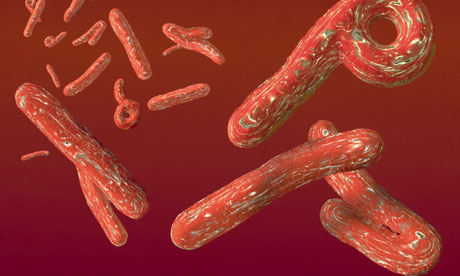After weeks of speculation about several mysterious deaths, Ugandan officials confirm 14 people have died from the Ebola virus.
Health officials told reporters in Kampala that the 14 dead were among 20 reported with the disease. Among those who died were a woman and her four-month-old baby. Two of the infected have been isolated for examination by researchers and health officials.Ugandans are being urged to stay calm, with officials saying a national emergency task force has been set up to stop the disease from spreading far and wide.
Ebola, which manifests itself as a hemorrhagic fever, is highly infectious, kills quickly and there is no known cure.
It was first reported in 1976 in Congo and is named after the river where it was recognized.
A factsheet on Ebola from the Centres for Disease Control and Prevention says the disease is "characterised by fever, headache, joint and muscle aches, sore throat, and weakness, followed by diarrhoea, vomiting, and stomach pain".
It adds: "A rash, red eyes, hiccups and internal and external bleeding may be seen in some patients."
Government officials and a World Health Organisation representative confirmed the Ebola outbreak at a news conference in Kampala on Saturday. "Laboratory investigations done at the Uganda Virus Research Institute ... have confirmed that the strange disease reported in Kibaale is indeed Ebola haemorrhagic fever," they said in a joint statement.
Health officials said at least 20 people had been infected and of those 14 had died.
There is no treatment or vaccine against Ebola, which is transmitted by close personal contact and, depending on the strain, can kill up to 90% of those who contract the virus.
It has a devastating history in Uganda, where in 2000, at least 425 people were infected, of whom more than half died. Ebola was previously reported in the country in May last year, when it killed a 12-year-old girl.
During an outbreak in 2007, which claimed at least 37 lives, President Yoweri Museveni advised people not to shake hands and public gatherings were also discouraged.
One of those who succumbed to the outbreak in Kibaale was a clinical officer, Besisira said. The other fatalities came from a single household in Nyamarunda subdistrict, he added.
Joaquim Saweka, WHO's representative in Uganda, said the suspected infections emerged in the region in early July but the confirmation came only on Friday.
The Ugandan government said a national emergency taskforce had been set up and urged the population to remain calm. The government, WHO and the US Centres for Disease Control have sent experts to Kibaale to tackle the outbreak.
Besisira said officials in Kibaale had released radio broadcasts outlining precautionary measures on Saturday. "We have assured (the people) that we have a very strong team … who are making sure the disease is controlled … I am very confident we can contain it," he added.
Besisira had not heard of people moving out of the region, but the Daily Nation newspaper in neighbouring Kenya said on Sunday that people were leaving the area around Kagadi town, where the disease first appeared.
"We have to move to safer places because we can easily get infected by this disease here," the paper quoted a resident, Omuhereza Kugonza, as saying.
The WHO describes Ebola as "a viral haemorrhagic fever and one of the most virulent diseases known to humankind". It says the disease was identified in 1976 in a western equatorial province of Sudan and a nearby region of Zaire (now Democratic Republic of the Congo). It takes its name from a river in the DRC.














0 comments:
Post a Comment